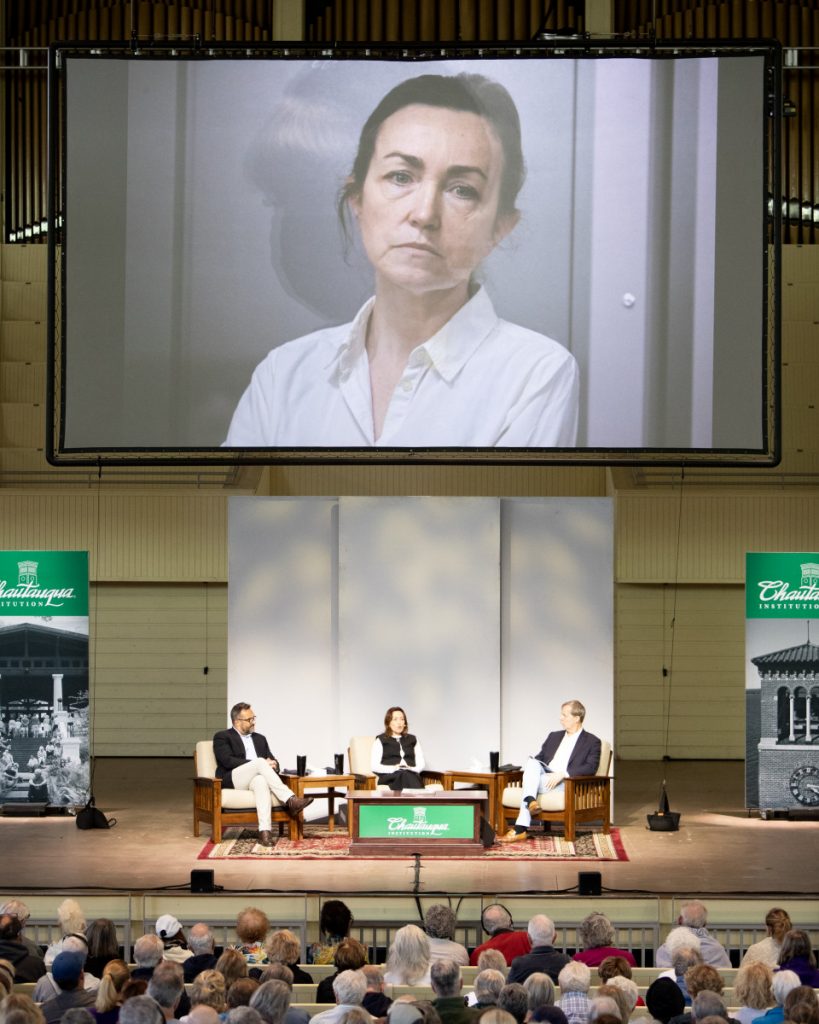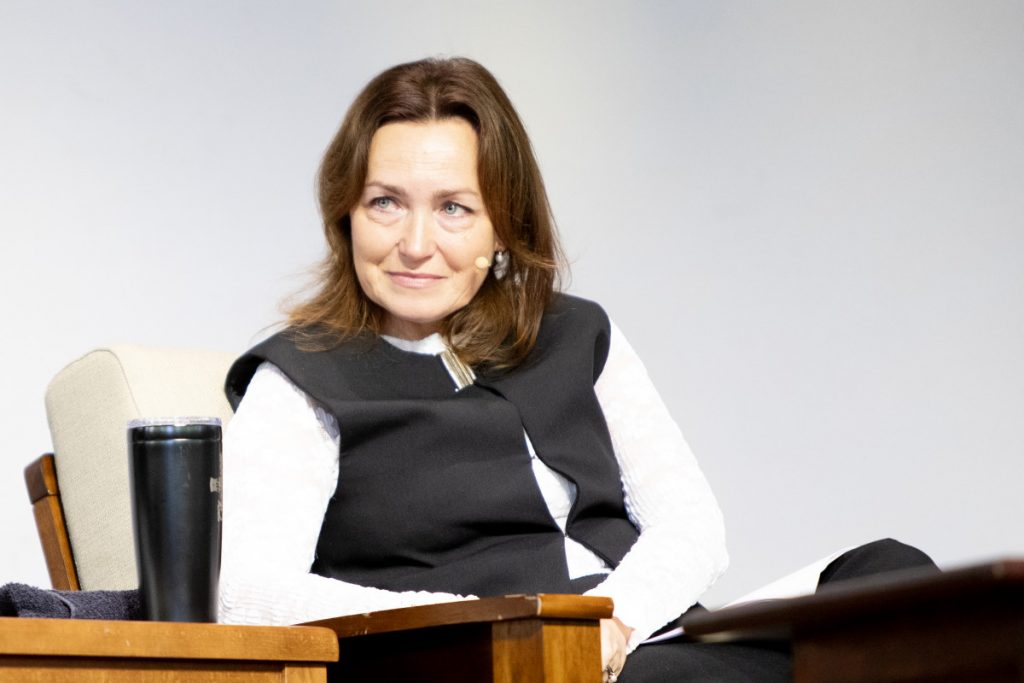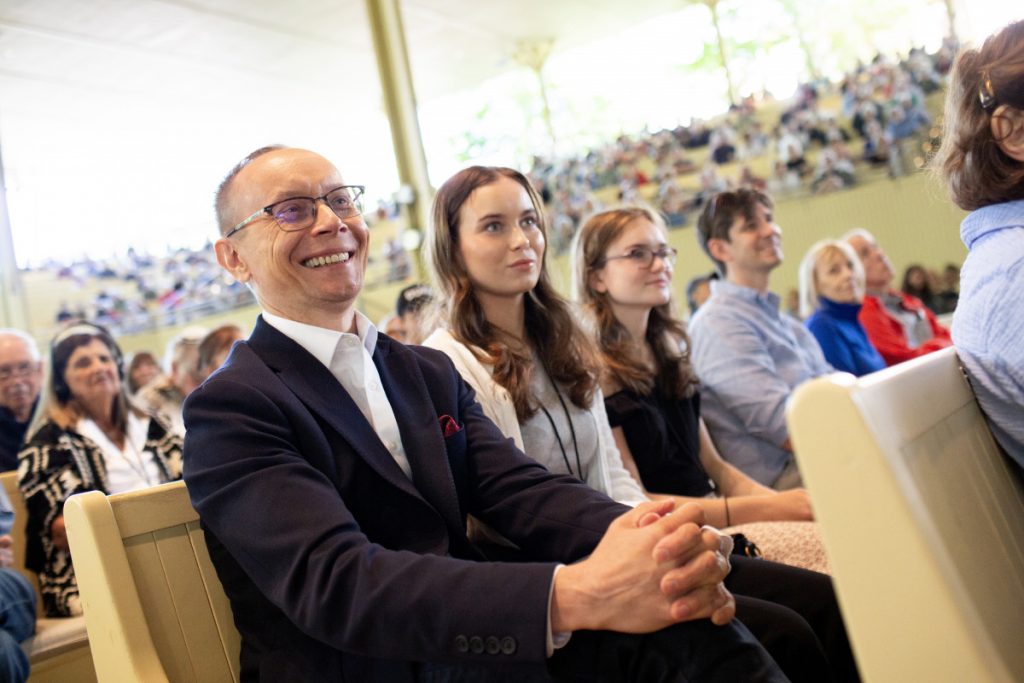
Von Smith
Staff Writer
Alsu Kurmasheva, journalist and editor at Radio Free Europe/Radio Liberty, looked at her husband and two daughters as she spoke to the Amphitheater exactly one year after being released from Russian detention.
“I never wish anyone should go through those things to understand hugs in the morning and tucking in your children in the evening for granted,” Kurmasheva said. “I want everybody to understand that our freedom is not for granted. Free speech is not for granted. It can change any time.”
At 10:45 a.m. Friday in the Amp, Kurmasheva sat between Roger Carstens, former special presidential envoy for hostage affairs, and Almar Latour, publisher of The Wall Street Journal and chief executive officer of Dow Jones, as they recounted the 288 days Kurmasheva spent in Russian detention before being released a year ago on the day. Wall Street Journal reporter Evan Gershkovich was also released with Kurmasheva, as well as former U.S. Marine Paul Whelan and several other high profile detainees.
The final discussion of the Chautauqua Lecture Series theme “The Global Rise of Authoritarianism” closed out Week Six with three different perspectives on the internationally coordinated effort to free Kurmasheva and Gershkovich.
Almar Latour, a former reporter at The Chautauquan Daily, recounted receiving the call in 2023 that Gershkovich had gone missing while visiting Robben Island off the coast of Africa, the location of the infamous prison which held Nelson Mandela during Apartheid.
After 48 hours in the dark, Gershkovich’s location was finally revealed when the Federal Security Service of the Russian Federation — the successor of the KGB — released a press statement of his detention to a global audience.
Russian officials falsely accused Gershkovich of political espionage, and soon after, pictures began appearing of Gershkovich in a glass box with his “signature smirk,” Latour said.
Several weeks later, Latour and his team were sitting in a “dark alley of the State Department” with Carstens as they began breaking down the steps to release Gershkovich and Kurmasheva.
“I’ve got to say — Roger is an American hero,” Latour said. “When you walk into his office, not only are you greeted by the statements of philosophers over time, but more striking is a line of pictures from people who have been freed by his team from many different situations all over the world.”
Carstens, well-experienced in the field of Russian hostage negotiation from WNBA star Brittney Griner’s imprisonment in 2022, was immediately certain that Kurmasheva’s and Gershkovich’s detainment would be used as bargaining chips in a hostage deal.
Under the Biden Administration alone, Carstens oversaw the release of 60 people, including Kurmasheva and Gershkovich. Of all of those cases, Carstens said the Russian prisoner exchange was the hardest effort.
He recalled sitting down with the Gershkovich family as the negotiations began to play out.
“This is not going to be easy. It’s going to take some time,” Carstens had said to the family. “The best way to handle those situations is with brutal truth and transparency. You can never lie to a family, especially a family in pain.”

“I have had to sit and see or talk to a crying wife, a crying mother, a crying husband who is asking me when my loved one is coming home. And you have to look them in the eyes and say ‘I don’t know,’ ” Carstens said. “But we know how the story ends. It ends with a loved one coming back to the United States safe and secure.”
Carstens’ team worked around the clock to negotiate with Russian officials on the release of the prisoners while also putting in time to comfort their families and guide them through the process.
Kurmasheva had heard of Gershkovich’s arrest seven months prior to traveling to Russia, but didn’t expect to be targeted — she was not on a work trip and, as a Russian citizen, would be protected from prison by law as a mother of two children.
Kurmasheva wasn’t designated by the U.S. State Department as wrongfully detained until late into the case, making it difficult or impossible for Carstens to officially coordinate with her family.
Kurmasheva detailed the moment she was arrested by masked Russian officials: “I was brutally taken, handcuffed in front of my mom, who I was visiting, and she needed my care.”
Agents confiscated both of Kurmasheva’s American and Russian passports, leaving her on house arrest and fining her $100 for not declaring her U.S. citizenship.
Five months later, Kurmasheva was in her mother’s home on house arrest, expecting to return to the United States shortly when masked agents stormed in and arrested her.
“The only thing I told my shocked mom and neighbors, ‘Please don’t forget to turn off the stove,’ ” Kurmasheva said. “Later I was thinking, ‘Was that the only thing going through my mind?’ I think it was a means of survival, so my mother and I don’t go insane.”
Kurmasheva specialized in regional journalism, focusing on reporting for the Tatar ethnic minority, the largest minority group in Russia. Her coverage included work from the ongoing Russia-Ukraine war, a topic which had become dangerous under President Vladimir Putin’s regime.
“When the war in Ukraine started and with all that legislation about foreign agent laws and foreign media companies, it became impossible to cover Russia and stay safe there,” Kurmasheva said.
Life in the Russian detention center was stark and unnerving. Kurmasheva described extended periods of time without any communication from the outside world and conditions in freezing, poorly ventilated cells with prisoners convicted of crimes, including murder.
The prison, which was built in the 19th century as a transit prison between Moscow and Siberia, had been sparsely updated since the 1970s, with only a small hole in the floor for a toilet. Kurmasheva was surveilled 24/7 by predominantly male guards as she changed, bathed and used the restroom. Her sleep habits were interrupted by severely mentally ill prisoners, a tactic used on purpose to soften Kurmasheva during interrogations.
“I remember the smell. I have never experienced that smell in my life. It’s a smell of fear, enormous fear and uncertainty, and it’s not only in prison,” she said. “That smell was in the air when I arrived in the country. They were well into the war already, which they were not allowed to call a war.”
At night, cell walls often froze from the inside, and little hot water was given to make coffee or tea.
“There were days that I just wouldn’t change, and I wouldn’t brush my teeth because I was just unable to get up and warm up the water to do so,” Kurmasheva said.
She described the letters she received as being the only source of sanity in the environment designed to break her down.
“They would occasionally bring me letters also from the United States, Europe, Russia. Before opening those letters, I would make myself get up, brush my teeth and do it because this is how I survived,” she said. “My survival only depended on the help of the outside world.”

“I didn’t have hope for many, many months. I was just stuck with this survival because I knew that I had to survive, to come back to be here with you. Just survival. I knew that my family, Radio Free Europe and journalists around the world would be working. I just didn’t know how and when I could come back,” Kurmasheva said.
Carstens and his team began tracking the case as soon as Kurmasheva was placed on house arrest in May 2023. Without the designation of wrongfully detained, there was little the U.S. State Department could do over her return.
As she settled into house arrest, Carstens had hoped the case would fizzle out and Kurmasheva would return home without an intervention. After she was taken again on Oct. 18, 2023, Carstens again hoped that the case would resolve itself; however, that is not what happened.
“In my mind, Russians are starting to gain — (they) are trying to stack up leverage for a future prisoner swap,” Carstens recalled thinking at the time.
Before Carstens could begin any form of action, his team had to convince the Secretary of State Antony Blinken that Kurmasheva had been wrongfully detained. A process difficult even in the United States, and nearly impossible in Russia with little information being expelled.
“We also could not determine what the Russians wanted,” Latour said. “The Russians were, as I understood it, noncommunicative, and there wasn’t a lot of signaling as to what we wanted specifically. This made it hard to act on as well.”
In many cases, Carstens enlists the help of families to advocate for their loved ones in newspapers, on social media and on TV. Personal storytelling is integral to the process of freeing hostages and helps develop national support, according to Carstens.
Gershkovich’s mother and family were outspoken in their support for his return, and so was Kurmasheva’s husband and two daughters. Latour worked to advocate for Gershkovich’s release from The Wall Street Journal newsroom.
A picture from The Wall Street Journal’s office featured staff standing with a portrait of Gershkovich with the hashtag #IStandWithEvan. His picture remained up for the entirety of his detention, and the team made the decision to run his photo on the entire Wall Street Journal front page.
Latour’s efforts brought the arrest to international attention and played a large role in generating the wave of support that would fuel the government’s action.
As the release campaign was growing stronger, Kurmasheva’s prison conditions worsened, a deliberate action she linked to growing animosity as international advocacy increased. She would go on to spend Christmas and New Years in one of the worst cells in the 1,000-cell facility.
“Occasionally, I would get small messages from my husband through my lawyer, saying, ‘I have been on a trip, and I’m hopeful.’ That’s it. I have no idea where he went. I have no idea who he met,” Kurmasheva said. She chose to be hopeful, knowing her husband wouldn’t say that without a strategy.
Simultaneously, Carstens’ team was working on an international campaign convincing other governments to release their prisoners as part of a coordinated deal, as Latour solidified support from competitors, such as The Washington Post and The New York Times.
Months later, Kurmasheva received a knock on her cell door and then was escorted by train on a three-day journey across Russia with no knowledge of where she was going.
“I was demanded to change into a prison robe. They couldn’t find my size because I had lost so much weight. I saw myself in the mirror after ten months of imprisonment, and I couldn’t believe it,” Kurmasheva said.
Soon after, Latour was in the Washington D.C. newsroom waiting patiently for a plane carrying Kurmasheva and Gershkovich to touchdown in Türkiye.
“The reporters of The Wall Street Journal and from many other news organizations are trying to piece together and confirm, can we actually release the story that they’re free?” Latour said. “We set a rule that unless the prisoners are in U.S. custody, we cannot share that — because we believe in facts at The Wall Street Journal.”
Latour stepped out of the newsroom to call Carstens. On the other line, Carstens said the words Latour would never forget: “Your man is free.” The Wall Street Journal was quick to break the news.
On the airport tarmac one year ago, Evan Gershkovich and Alsu Kurmasheva embraced their families in front of an entourage of reporters, diplomats, President Joe Biden and Vice President Kamala Harris.
“I can’t stop hugging my children and my family. I will never stop that,” Kurmasheva said. “I enjoy every moment, especially the moments of arguments with two teenagers trying to make their way and make their wishes come true. I can’t even say anything, and they would hug me and say, ‘Mom, we are so happy to have you back.’ ”




